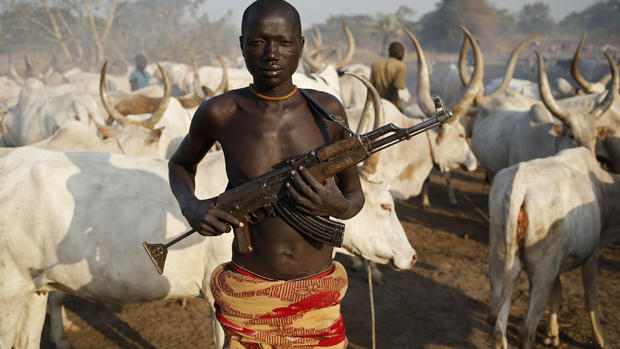200 dead in S. Sudan after boat fleeing war sinks
JUBA, South Sudan -- Some 200 people fleeing warfare died after a boat crossing the Nile River sank, a South Sudanese military official said Tuesday, as fighting between rebels and government forces moved closer to the national capital.
Warfare in the world's newest state has displaced more than 400,000 people since mid-December, with the front lines constantly shifting as loyalist troops and renegade forces gain and lose territory in battles often waged along ethnic lines.
Lt. Col. Philip Aguer, the South Sudanese military spokesman, said there was fighting about 45 miles north of the South Sudanese capital of Juba.
As control of certain regions has changed, tens of thousands of residents have fled their homes to escape fighting that often pits the Dinka ethnic group of President Salva Kiir against the Nuer group of Riek Machar, the former vice president who now commands renegade forces. A boat on the Nile - fleeing the violence in Upper Nile State and carrying mostly women and children- sank, killing at least 200 people, Aguer said.
The violence has displaced 413,000 people, including more than 73,000 who sought refuge in neighboring countries, according to the United Nations.
Troops from neighboring Uganda appear to be actively fighting on behalf of President Salva Kiir, who is reportedly seeking the long-term commitment of Ugandan troops in the fight against renegade forces.
In Ethiopia, where peace talks are taking place, a spokesman for the rebels, former South Sudan Brig. Gen. Lul Ruai Kong, said Ugandan helicopters and fighter jets are bombing rebel positions.
Another pro-rebel official, Gideon Gatpan Thaor, said fighters described being hit with a smoky weapon that burns, possibly white phosphorous.
Uganda's military denies its forces are already involved in active combat but admit that is where they are headed following the rebels' threat to take Juba, where fighting erupted on Dec. 15 before it spread across the oil-producing East African country.
Lt. Col. Paddy Ankunda, the Ugandan military spokesman, said Tuesday that Ugandan and South Sudanese army officials are drafting what he called a "status of forces agreement" that will soon be signed by both countries after Kiir requested the Ugandans to extend their deployment.
When that pact is signed, he said, "there could be things under the agreement which the forces might engage in." He said a Ugandan army colonel previously with the African Union peacekeeping force in Somalia has been appointed as head of Ugandan forces in South Sudan, part of wider efforts by Uganda to formalize a mission that is increasingly controversial at home and abroad.
On a recent trip to Juba, Ugandan President Yoweri Museveni warned Machar that East African countries would unite to "defeat" him if he did not start talks with the government.
It now appears Museveni is going it alone, sending to South Sudan thousands of men and hardware that may have given government forces an edge against rebels who threatened Juba. Pro-Machar rebels have since lost the oil-producing capitals previously under their control, giving Kiir the upper hand against his rivals. Kiir has refused to release the political detainees who are Machar's allies, one of the conditions set by the rebels before they can sign any cease-fire deal with the government.
Ugandan officials initially said troops were deployed to South Sudan to protect key installations such as the airport as well as to facilitate civilian evacuations.
Amid rumors some Ugandan forces have been killed or wounded in South Sudan, Ugandan lawmakers on Tuesday met for a special session to discuss the legality of the deployment. Some lawmakers have described the intervention as misguided, saying it risks escalating a local political fight into a regional conflict. Members of Machar's negotiating team in Ethiopia have also warned that the presence of Ugandan troops in South Sudan undermines efforts to reach a cease-fire deal.
Museveni is highly influential in Juba, where his prestige is based in part on his decades-long support for the armed secessionist movement that eventually led to the creation in 2011 of the new state of South Sudan.
He was a close friend of John Garang, the late South Sudanese politician who was the undisputed leader of his people's quest for independence from Sudan before he was killed a helicopter crash in 2005. Last week his widow, a South Sudanese politician who has since become Machar's ally in his political contest with Kiir, was in Uganda for a meeting with Museveni that some saw as an effort to isolate Machar.
